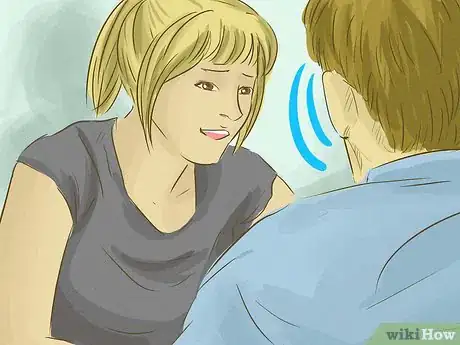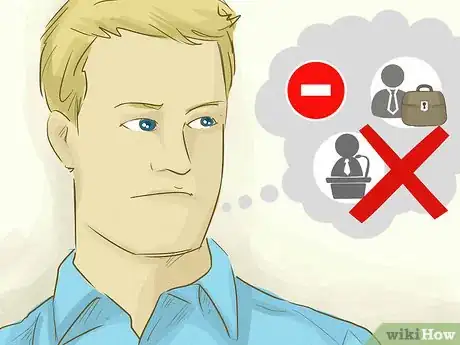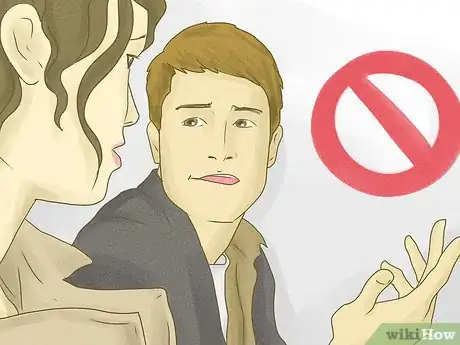This article was co-authored by Klare Heston, LCSW. Klare Heston is a Licensed Independent Clinical Social Worker based in Cleveland, Ohio. With experience in academic counseling and clinical supervision, Klare received her Master of Social Work from the Virginia Commonwealth University in 1983. She also holds a 2-Year Post-Graduate Certificate from the Gestalt Institute of Cleveland, as well as certification in Family Therapy, Supervision, Mediation, and Trauma Recovery and Treatment (EMDR).
This article has been viewed 62,034 times.
There are a variety of different ways to be open in your relationship—you might want to communicate more openly, learn to be more vulnerable, or even practice an open relationship. No matter what type of openness you're looking for, our guide can help!
Steps
Communicating Effectively
-
1Choose good times to talk. If you want to foster open conversation, talk regularly. Be on the lookout for times to talk to your partner, especially if you're bringing up a potentially touchy or stressful subject.
- Talk at a time free of outside distractions. For example, stop your partner to talk when they're lounging in the living room after dinner. You want a time free of outside time constraints where the conversation will not be easily disrupted.
- This is especially important if you're striving for a serious conversation. You should make sure you do not approach your partner about a serious matter when they are already stressed or busy.
-
2Listen as much as you talk. Communication goes both ways. If you want an open, honest relationship you want to make sure you understand your partner. Give them a chance to express themselves so you can be open with one another equally.[1]
- Do not think about what you plan to say next when your partner is talking. Instead, listen to their words. Try to understand what they're saying. Wait a few minutes after your partner finishes talking to respond. This makes sure they were done talking.
- It may feel awkward, but it's often helpful to rephrase what your partner just said. For example, "I'm hearing that you feel a little stressed at work right now because your boss is away on vacation." This can help assure your partner you heard them, making them feel open communicating with you in the future.
Advertisement -
3Watch non-verbal signals. As you're opening up, pay attention to your partner. Watch for non-verbal signals so you can see how your partner feels about what you're expressing. This can help you deal with any potential conflicts.[2]
- If you notice your partner folding their arms, they may feel defensive about something you're saying.
- If your partner does not make eye contact, they may not be listening, or they might be feeling uncomfortable or confused.
- If they speak in an aggressive tone, they may be angry.
-
4Deal with conflict calmly. If a conflict does arise, you need to discuss your feelings openly and honestly. Do so in a respectful fashion. Do not yell or become agitated. Instead, say something like, "It seems like we're clashing here. Can we take a step back, and talk about the issue openly and respectfully?"
- Using "I"-statements can help here. These statements minimize blame, which can help with openness. They have three parts. They begin with, "I feel..." after which you immediately state your feeling. Then, you explain the actions that lead to that feeling. Lastly, you say why you feel the way you do.[3]
- For example, "I feel controlled when you discourage me from hanging out with Steffany because I think I should be allowed to have friends, even if you don't like them."
-
5Remain in the present. During any conversation, remain in the present. You should never let your thoughts wander to other territories when your partner is talking. This can damage openness in a relationship. Your partner is unlikely to feel like they can be open with you if you're not 100% present.[4]
- If you feel your mind wandering, find a way to return it to the present. You can, for example, pay attention to a physical sensation, like the feeling in your toes, to help ground you in the moment. You can also focus on your breathing and try to take slow, deep breaths.
Getting Someone to Open Up
-
1Establish a relaxed mood. You need to have a relaxed mood overall if you want your partner to open up. If someone feels constantly scrutinized or stressed, they're unlikely to feel comfortable being open. Try to keep the mood light most of the time so your partner feels safe opening up.[5]
- Plan activities you both enjoy throughout the day. You can, for example, see a movie together or play a board game. This will foster a sense of calm that can lead to open communication.
- Make jokes. It's always great to make a joke now and again. Laughter can put people at ease.
-
2Let someone know you want to talk. If you want your partner to open up, tell them. It's a good idea to let your partner know when you want to talk things over. Do so in a gentle manner so your partner feels comfortable and not threatened or pressured.[6]
- State your intentions clearly. If you're open, your partner will be more likely to be more open as well. For example, say something like, "I'd like to have a talk so we can both understand one another better." Avoid saying “We need to talk” because this can put your partner on the defensive.
- Choose a time when your partner is not busy to bring something up. For example, you could wait until they're relaxing after work in front of the TV to try to have a meaningful conversation.
-
3Avoid explaining and justifying. Communication is not always pleasant. Your partner may be open about something you did that hurt or upset them. In any relationship, there are two sides to a story. If your partner is open about something that hurt them, do not explain or justify.[7]
- For example, your partner says, "It hurt my feelings you didn't invite me out with your friends last week."
- You may have had reasons for going out alone that are valid. However, you do not want to dismiss your partner's concerns as this will make them feel they can't be open.
- Don't start with, "I just wanted some friend time alone. That's reasonable." Instead say, "I'm sorry that hurt your feelings. That was not my intention at all." After apologizing, you can have a longer conversation about alone time with your friends if necessary.
-
4Do not make assumptions. Oftentimes, in a relationship, you assume you know everything about someone. You may assume you know all the information about your partner simply because you're close. Such assumptions can make your partner feel distant, preventing openness.[8]
- When your partner is talking, leave your assumptions behind. There may be something about them you don't know yet, or there may be new circumstances your partner has not yet told you. If you approach the situation with an open mind, you may end up learning something new.
- Listen without judgment and allow your partner to talk. It can help to pretend you're interacting with a stranger who you know nothing about.
-
5Strengthen your relationship overall. Making your relationship stronger overall can help make your partner feel comfortable being open with you. New experiences help strengthen existing relationships, leading to stronger, better bonds.[9]
- Take a class together. A cooking class or horseback riding class can allow you to experience new things together.
- Go on a trip together. Shared experiences can be a great way to make your bond stronger.
- Simply strive to spend more time together at home. Small things, like doing chores together or eating dinner together, can gradually strengthen a bond.
Establishing an Open Relationship
-
1Establish clear boundaries. From the beginning, there need to be clear boundaries in an open relationship. The term can mean different things for different people. You and your partner should be on the same page regarding expectations.
- Decide what kind of outside relationships are appropriate. For some people, casual sexual encounters are okay but not romantic entanglements. For others, it's okay to date other people.
- Think about anything you wouldn't want your partner to do with someone else. Maybe mutual friends are off limits. Maybe you wouldn't want your partner to engage in a certain sex act with someone else.
- Have a long, serious discussion to establish boundaries that work for both of you before practicing openness.
-
2Make the transition slowly. Do not jump from being strictly monogamous to an open relationship overnight. Being open is a big transition and you should take things slowly so you both have time to accept a new relationship.
- Even if you're allowed to see other people, do not do so before you're ready. You don't have to jump into anything simply because you can. Instead, wait until an opportunity that you feel comfortable with presents itself.
-
3Discuss jealousy as it arises. Jealousy may occur in an open relationship. It's important to address it as it arises so you and your partner can both feel safe and valued in the relationship.
- If you are jealous, talk about it. Talk about why you're jealous and try to figure out where it comes from. If you're serious about a non-monogamous relationship, you should address the roots of jealousy so you best know how to handle it.
- Begin the conversation in a non-confrontational way. Say something like, "Hey, I'm feeling a little jealous. Can we talk this over so our relationship stays strong?"
-
4Stay honest. It's important to stay honest throughout the relationship. An open relationship requires constant communication. You should let your partner know how you're feeling about how things are progressing and whether anything is making you feel uncomfortable or uneasy.[10]
-
5Revisit the situation often. Open relationships change over time. Periodically, have a talk with your partner about how you're feeling regarding the relationship and any changes you would like to make.
- Sometimes, you may think you are comfortable with something only to find you dislike it in practice. This is okay and should be discussed with your partner.
- About once a month, try to have a sit down talk with your partner about your feelings on the open relationship.
- Keep in mind that relationships change and grow. Your feelings may change over time, or as your relationship deepens.
Expert Q&A
-
QuestionWhat makes a close friend?
 Klare Heston, LCSWKlare Heston is a Licensed Independent Clinical Social Worker based in Cleveland, Ohio. With experience in academic counseling and clinical supervision, Klare received her Master of Social Work from the Virginia Commonwealth University in 1983. She also holds a 2-Year Post-Graduate Certificate from the Gestalt Institute of Cleveland, as well as certification in Family Therapy, Supervision, Mediation, and Trauma Recovery and Treatment (EMDR).
Klare Heston, LCSWKlare Heston is a Licensed Independent Clinical Social Worker based in Cleveland, Ohio. With experience in academic counseling and clinical supervision, Klare received her Master of Social Work from the Virginia Commonwealth University in 1983. She also holds a 2-Year Post-Graduate Certificate from the Gestalt Institute of Cleveland, as well as certification in Family Therapy, Supervision, Mediation, and Trauma Recovery and Treatment (EMDR).
Licensed Social Worker A close friend is someone you trust, someone you can easily express yourself to, someone who is willing to understand and accept you, and someone who 'has your back.' It doesn't have to be a person who agrees with you or even shares all of your interests. Sometimes, opposites attract.
A close friend is someone you trust, someone you can easily express yourself to, someone who is willing to understand and accept you, and someone who 'has your back.' It doesn't have to be a person who agrees with you or even shares all of your interests. Sometimes, opposites attract.
References
- ↑ http://psychcentral.com/blog/archives/2009/04/14/9-steps-to-better-communication-today/
- ↑ http://psychcentral.com/blog/archives/2009/04/14/9-steps-to-better-communication-today/
- ↑ http://www.goodtherapy.org/blog/psychpedia/i-message
- ↑ http://psychcentral.com/blog/archives/2009/04/14/9-steps-to-better-communication-today/
- ↑ http://www.canadianliving.com/life-and-relationships/relationships/article/8-ways-to-get-your-partner-to-open-up-to-you
- ↑ https://www.psychologytoday.com/blog/stronger-the-broken-places/201409/12-steps-getting-someone-open
- ↑ https://www.psychologytoday.com/blog/stronger-the-broken-places/201409/12-steps-getting-someone-open
- ↑ http://www.canadianliving.com/life-and-relationships/relationships/article/8-ways-to-get-your-partner-to-open-up-to-you
- ↑ http://www.canadianliving.com/life-and-relationships/relationships/article/8-ways-to-get-your-partner-to-open-up-to-you










































































